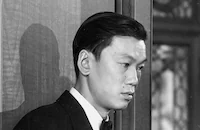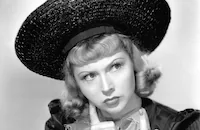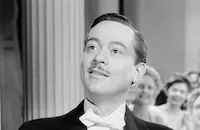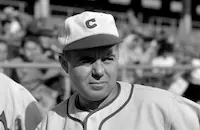Dark Alibi

Brief Synopsis
Cast & Crew
Phil Karlson
Sidney Toler
Mantan Moreland
Ben Carter
Benson Fong
Teala Loring
Film Details
Technical Specs

Synopsis
When ex-convict Thomas Harley arrives at the boarding house where he lives with his daughter June, he is arrested for robbing a bank and killing a bank guard. Although he claims that he was summoned to the Carey Theatrical Warehouse by a note from his former cell mate, Dave Wyatt, and subsequently locked inside, the police do not believe his alibi because Wyatt has been dead for eight years. After fingerprints found at the scene are identified as belonging to Harley, he is condemned to death. Determined to prove her father innocent, June contacts detective Charlie Chan, who agrees that the case against her father is suspect. Together with June's boyfriend, prison guard Hugh Kensey, Chan questions Mrs. Foss, the boardinghouse landlady, who often rents to ex-convicts. They discover that the note purporting to be from Wyatt was written on Foss's typewriter. Chan then questions the other boarders: Miss Petrie, who works for a small salary at a social foundation; Mr. Johnson, a bookkeeper for the Carey Theatrical company; Mr. Danvers, a salesman of bank alarm systems; and Emily Evans, a showgirl whose costume was found in the warehouse. Both Danvers and Evans had traveled to other cities immediately before banks in those locations were robbed. The next day, Chan, his son Tommy, and his chauffeur, Birmingham Brown, drive to the prison, where an unknown assailant shoots at them. Chan becomes convinced that the fingerprints found at the scene were forged. After studying the police reports, Chan discovers that although a different man was convicted for each of the previous robberies, each man had been jailed in the same prison and the modus operandi used was identical in each case. Miss Petrie is revealed to be the wife of Jimmy Slade, a convict trustee, who is employed in the fingerprint bureau of the prison. When Petrie disappears, Chan, Birmingham and Tommy hurry to the warehouse. There, they locate Johnson, and later, Petrie is killed by a truck outside the warehouse. When Chan returns to the prison and discovers that the fingerprint cards have been tampered with, Slade overhears Chan and is wounded while trying to escape. After stating that he will not take the rap, Slade dies. Chan then takes prints of all the boarders at the boarding house and finds Johnson's on one of the prison cards. Chan then returns to the warehouse and uncovers the equipment necessary for forging fingerprints in the truck that killed Petrie. Danvers then tries to kill Chan, as he did Johnson, to stop him from talking. After Harley is freed, Chan explains that Slade sent the prints to Johnson, who copied them for Danvers, who carried out the robberies. He adds that Kensey was the leader of the gang, and when Harley opposed his marriage to June, the guard framed him.

Director

Phil Karlson
Cast

Sidney Toler

Mantan Moreland
Ben Carter

Benson Fong
Teala Loring
George Holmes

Joyce Compton

John Eldredge

Russell Hicks
Tim Ryan
Janet Shaw
Edward Earle

Ray Walker
Milton Parsons
Edna Holland
Anthony Warde
George Eldredge
Meyer Grace
William Ruhl
Minerva Urecal
Frank Marlowe
Crew
James S. Burkett
George Callahan
Mario Castegnaro
Glenn Cook
Richard Currier
Larry Glickman
Ace Herman
Theodore Joos
Joseph I. Kane
Edward J. Kay
Tom Lambert
Dave Milton
Al Nicklin
Max Pittman
William Sickner
William H. Wilmarth

Film Details
Technical Specs

Articles
Dark Alibi -
Sidney Toler in Dark Alibi
From 1931 until 1949, the unflappable Asian sleuth Charlie Chan solved crimes in a series of 44 films that started at Fox and then moved to Monogram. Although, like most series films, the pictures were produced on relatively low budgets, the Chan pictures moved quickly, usually wrapping up their amazingly complicated mysteries in just over an hour. The films have become controversial in recent years because of their perpetuation of racist stereotypes in their depiction of the subservient Chan, his bumbling sons and his cowardly black chauffeur. Yet the series also has its defenders, who point out that Chan's expertise far outshines that of the white police officers working alongside him (and sometimes getting in his way). More telling is the fact that, although Chan's offspring were always played by Asian-American actors, the leading man was always portrayed by a white actor in stereotypical makeup.
For the series' 35th entry, a young woman enlists Chan (Sidney Toler) to prove that her ex-convict father was framed for bank robbery and murder, even though the police have his fingerprints at the crime scene. The investigation takes Chan, number three son Lee (Benson Fong) and chauffeur Birmingham Brown (Mantan Moreland) to the man's prison (one of the working titles was Charlie Chan in Alcatraz) to investigate a complicated criminal band that reaches into the ex-convict's personal life.
Novelist Earl Derr Biggers created Chan in 1925 in an attempt to counter the then-popular stereotype of Asian men as super-villains, like Fu Manchu. Sadly, the character would usher in another stereotype, the sexless Asian man with a submissive attitude and only a cursory knowledge of the English language. The first screen interpretations featured Asian actors, though in those early films Chan was treated as a supporting player. In the third film to feature the character, Fox's Behind That Curtain (1929), he doesn't even show up until the film's final ten minutes. In 1931, however, the studio cast Warner Oland, a white actor who claimed he had Mongolian ancestors, in Charlie Chan Carries On, the first of the official Charlie Chan series. They would cast Oland in 15 films, some of them notable for showcasing rising stars like Rita Hayworth, Robert Young, Ray Milland, George Brent and Leon Ames. When Oland died in 1938, the role went to Toler, another Caucasian actor. The early Chan films were big hits for Fox, helping it survive the diminished film attendance of the Great Depression's early years. By the '40s, however, they weren't as prestigious, and the studio decided to cancel the series with 1942's Castle in the Desert. At that point, Toler did something unheard of for a featured player in Hollywood. He bought the film rights himself and then peddled them to Monogram. They produced Chan films for another five years, with Roland Winters taking over the role when Toler died in 1947.
With the 1935 Charlie Chan in Paris, the series introduced Chan's number one son, Lee, played by Keye Luke. Other sons would turn up played by Victor Sen Yung, Fong and Edwin Luke. He even had a daughter assist him in one film, played by the appropriately named Frances Chan. Monogram added another regular to the series in 1944's Charlie Chan in the Secret Service, casting Moreland as Chan's driver Birmingham Brown. Moreland's character would prove as controversial as Chan. In the '60s, his portrayal of Brown as a cowardly, uneducated servant was derided as a destructive stereotype. In more recent years, however, critics have reevaluated his work, suggesting that Moreland's skills at playing comedy made the role seem more subversive, as if the actor were taking an ironic attitude toward the character.
The Secret Clue (1945), Monogram took advantage of Moreland's vaudeville background. Both films cast him with Ben Carter, his straight man in a comedy act back when they toured the vaudeville circuits. In fact, their three scenes together in this film draw heavily on their act. Also returning to the series was Russell Hicks, who had previously appeared in Charlie Chan in Shanghai (1935), as the warden, while Tim Ryan (Foggy) would return as a different character in Shanghai Chest, The Golden Eye (both 1948) and the series' final film, The Sky Dragon (1949).
Low-budget films often gave promising young directors a chance to break into feature filmmaking, with Fred Zinnemann cutting his teeth on MGM's Kid Glove Killer (1942) and William Castle directing for such Columbia film series as The Whistler and The Crime Doctor. Dark Alibi was the second of two Chan films helmed by Phil Karlson (the other was 1945's The Shanghai Cobra), who would become a darling of the auteur critics with his work on such '50s films noirs as 99 River Street (1953), The Phenix City Story (1955) and The Brothers Rico (1957). He got a shot at A pictures with 1960's Hell to Eternity, followed by such hits as Kid Galahad (1962), starring Elvis Presley, Ben (1972) and Walking Tall (1973), the latter shot on the locations in which his classic The Phenix City Story was set.
Director: Phil Karlson
Producer: James S. Burkett
Screenplay: George Callahan
Based on characters created by Earl Derr Biggers
Cinematography: William A. Sickner
Score: Edward J. Kay
Cast: Sidney Toler (Charlie Chan), Mantan Moreland (Birmingham Brown), Ben Carter (Benjamin Brown), Benson Fong (Tommy Chan), Teala Loring (June Harley), George Holmes (Hugh Kenzie), Joyce Compton (Emily Evans), Russell Hicks (Warden Cameron), Tim Ryan (Foggy)
By Frank Miller

Dark Alibi -
Quotes
Trivia
Notes
The film's working titles were Fatal Fingerprints, Fatal Fingertips and Charlie Chan in Alcatraz. The opening title card reads: Charlie Chan in Dark Alibi. The CBCS lists Minerva Urecal as "Mrs. Foss" but production information included in the file on the film at the AMPAS Library states that she was replaced by Edna Holland, who is listed in the onscreen credits. For more information on the Charlie Chan series consult the Series Index and see the entry for Charlie Chan Carries On in AFI Catalog of Feature Films, 1931-40; F3.0663.














